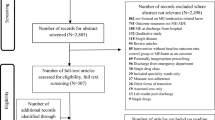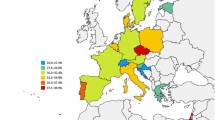Abstract
Background Acutely ill older persons are more likely to suffer adverse drug reactions, increasing morbidity, and mortality. The incident adverse drug reactions and their consequences on the length of hospital stay (LOS) in older persons have been little explored. Objective To determine the incident adverse drug reactions in acutely ill older inpatients and their effect on the LOS. Setting Internal medicine service in a Chilean teaching hospital. Method A prospective cohort study was conducted in patients aged ≥ 60 years admitted into the internal medicine service of the Hospital from University of Chile. Characteristics, severity, and causality of adverse drug reactions were assessed. Effect of incident adverse drug reactions on the LOS was determined using multiple Cox regression. A secondary analysis was conducted in patients aged ≥ 65 years. Main outcome measure Incident adverse drug reactions (new events occurring in hospital) and their effect on the LOS in older inpatients. Results A total of 229 acutely ill older persons ≥ 60 years were followed-up. Fifty-six of them suffered 77 adverse drug reactions (incident rate 24.5%; 95% CI: 19.0, 30.5), 70.1% type A. Adverse drug reactions were severe in 5.4% of cases. Causality assessment indicated the majority were probable (57.1%) and 3.9% certain. Cardiovascular agents were the therapeutic class more frequently involved. The most frequent adverse drug reaction was hypotension (19.5%). Patients with adverse drug reactions had a significantly prolonged LOS than those without adverse drug reactions (12.4 ± 11.0 versus 7.3 ± 6.4 days; p < 0.0001) (adjusted Hazard Ratio 0.63; 95% CI: 0.46, 0.87; p < 0.01), respectively. The incidence rate of adverse drug reactions in patients ≥ 65 years was 25.1% (95% CI: 19.0; 32.1), and their occurrence was significantly associated with a prolonged LOS (p < 0.05). Conclusion One in four acutely ill older persons hospitalized in the internal medicine service suffered at least one incident adverse drug reaction, which prolonged the LOS by 5 days. There is a potential to optimize the use of hospital beds and medication safety by preventing adverse drug reactions in geriatric patients.

Similar content being viewed by others
References
Edwards IR, Aronson JK. Adverse drug reactions: definitions, diagnosis, and management. Lancet. 2000;356(9237):1255–9.
Alhawassi TM, Krass I, Bajorek BV, Pont LG. A systematic review of the prevalence and risk factors for adverse drug reactions in the elderly in the acute care setting. Clin Interv Aging. 2014;9:2079–86.
White TJ, Arakelian A, Rho JP. Counting the costs of drug-related adverse events. Pharmacoeconomics. 1999;15(5):445–58.
Davies EC, Green CF, Mottram DR, et al. Adverse drug reactions in hospitals: a narrative review. Curr Drug Saf. 2007;2(1):79–87.
Pirmohamed M, James S, Meakin S, et al. Adverse drug reactions as cause of admission to hospital: prospective analysis of 18 820 patients. BMJ. 2004;329(7456):15–9.
Wester K, Jönsson AK, Spigset O, et al. Incidence of fatal adverse drug reactions: a population based study. Br J Clin Pharmacol. 2008;65(4):573–9.
Davies EC, Green CF, Taylor S, Williamson PR, Mottram DR, Pirmohamed M. Adverse drug reactions in hospital in-patients: a prospective analysis of 3695 patient-episodes. PLoS ONE. 2009;4(2):e4439.
Patel KJ, Kedia MS, Bajpai D, Mehta SS, Kshirsagar NA, Gogtay NJ. Evaluation of the prevalence and economic burden of adverse drug reactions presenting to the medical emergency department of a tertiary referral centre: a prospective study. BMC Clin Pharmacol. 2007;7:8.
Tangiisuran B, Gozzoli MP, Davies JG, Rajkumar C. Adverse drug reactions in older people. Rev Clin Gerontol. 2010;20(03):246–59.
Sari AB, Sheldon TA, Cracknell A, et al. Sensitivity of routine system for reporting patient safety incidents in an NHS hospital: retrospective patient case note review. BMJ. 2007;334(7584):79.
Waller P, Shaw M, Ho D, et al. Hospital admissions for ‘drug-induced’ disorders in England: a study using the Hospital Episodes Statistics (HES) database. Br J Clin Pharmacol. 2005;59(2):213–9.
Sera L, McPherson M. Pharmacokinetics and pharmacodynamic changes associated with aging and implications for drug therapy. Clin Geriatr Med. 2012;28(2):273–86.
Tangiisuran B, Davies JG, Wright JE, Rajkumar C. Adverse drug reactions in a population of hospitalized very elderly patients. Drugs Aging. 2012;29(8):669–79.
Mangoni A. Geriatric medicine in an aging society: Up for a challenge? Front Med. 2014;1:10.
Servicio Nacional del Adulto Mayor (SENAMA). Ministerio de Desarrollo Social de Chile. In Glosario Gerontológico. 2020. http://www.senama.gob.cl/storage/docs/GLOSARIO_GERONTOLOGICO.pdf Accessed 16 April 2020.
Organization of American States. Inter-American convention on protecting the human rights of older persons. 2015. http://www.oas.org/en/sla/dil/inter_american_treaties_A-70_human_rights_older_persons.asp. Accessed 16 April 2020.
Harugeri A, Parthasarathi G, Ramesh M, Guido S, Basavanagowdappa H. Frequency and nature of adverse drug reactions in elderly in-patients of two Indian medical college hospitals. J Postgrad Med. 2011;57(3):189–95.
Masnoon N, Shakib S, Kalisch-Ellett L, Caughey GE. What is polypharmacy? A systematic review of definitions. BMC Geriatr. 2017;17(1):230.
Hartwig S, Siegel J, Schneider P. Preventability and severity assessment in reporting adverse drug reactions. Am J Health-Syst Pharm. 1992;49:2229–32.
Naranjo CA, Busto U, Sellers EM, Sandor P, Ruiz I, Roberts E, et al. A method for estimating the probability of adverse drug reactions. Clin Pharmacol Ther. 1981;30(2):239–45.
Rawlins MD, Thompson JW. Pathogenesis of adverse drug reactions. In: Davies DM, editor. Textbook of adverse drug reactions. Oxford: Oxford University Press; 1977. p. 10.
WHO anatomical therapeutic chemical (ATC) classification. Oslo: BMJ Publishing Group; 2019.
Charlson ME, Pompei P, Ales KL, MacKenzie CR. New method of classifying prognostic comorbidity in longitudinal studies: development and validation. J Chron Dis. 1987;40(5):373–83.
Pires de Figuereido T, de Souza Groia R, Costa S, Gonzaga do Nascimento M, MoreiraRes A. Factors associated with adverse drug reactions in older inpatients in teaching hospital. Int J Clin Pharm. 2017;39(4):679–85.
Lavan A, Eustace J, Dahly D, Flanagan E, Gallagher P, et al. Incident adverse drug reactions in geriatric inpatients: a multicentred observational study. Ther Adv Drug Saf. 2018;9(1):13–23.
O’Connor MN, O’Sullivan D, Gallagher PF, et al. Prevention of hospital-acquired adverse drug reactions in older people using screening tool of older persons’ prescriptions and screening tool to alert to right treatment criteria: a cluster randomized controlled trial. J Am Geriatr Soc. 2016;64(8):1558–66.
Gokula M, Holmes HM. Tools to reduce polypharmacy. Clin Geriatr Med. 2012;28(2):323–41.
Rochon PA, Gurwitz JH. Optimising drug treatment for elderly people: the prescribing cascade. BMJ. 1997;315(7115):1096–9.
Davies E, O’Mahony M. Adverse drug reactions in special populations—the elderly. Br J Clin Pharmacol. 2014;80(4):796–807.
Formica D, Sultana J, Cutroneo PM, Lucchesi S, Angelica R, Crisafulli S, et al. The economic burden of preventable adverse drug reactions: a systematic review of observational studies. Expert Opin Drug Saf. 2018;17(7):681–95.
Ahmed B, Nanji K, Mujeeb R, Patel MJ. Effects of polypharmacy on adverse drug reactions among geriatric outpatients at a tertiary care hospital in Karachi: a prospective cohort study. PLoS ONE. 2014;9(11):e112133.
Hoonhout LHF, De Bruijne MC, Wagner C, Asscheman H, Van Der Wal G, Van Tulder MW. Nature, occurrence and consequences of medication-related adverse events during hospitalization: a retrospective chart review in the Netherlands. Drug Saf. 2010;33(10):853–64.
O’Connor MN, Gallagher P, Byrne S, O’Mahony D. Adverse drug reactions in older patients during hospitalization: are they predictable? Age Ageing. 2012;41:771–6.
Acknowledgements
We wish to thank Daniela Cornejo for her contributions during the early phases of this work.
Funding
This research was provided by FONIS SA14ID0141 from the Agencia Nacional de Investigación y Desarrollo (ANID) safety by preventing ADRs.
Author information
Authors and Affiliations
Corresponding author
Ethics declarations
Conflicts of interest
The authors declare that they have no conflict of interest.
Additional information
Publisher's Note
Springer Nature remains neutral with regard to jurisdictional claims in published maps and institutional affiliations.
Rights and permissions
About this article
Cite this article
Sandoval, T., Martínez, M., Miranda, F. et al. Incident adverse drug reactions and their effect on the length of hospital stay in older inpatients. Int J Clin Pharm 43, 839–846 (2021). https://doi.org/10.1007/s11096-020-01181-3
Received:
Accepted:
Published:
Issue Date:
DOI: https://doi.org/10.1007/s11096-020-01181-3




